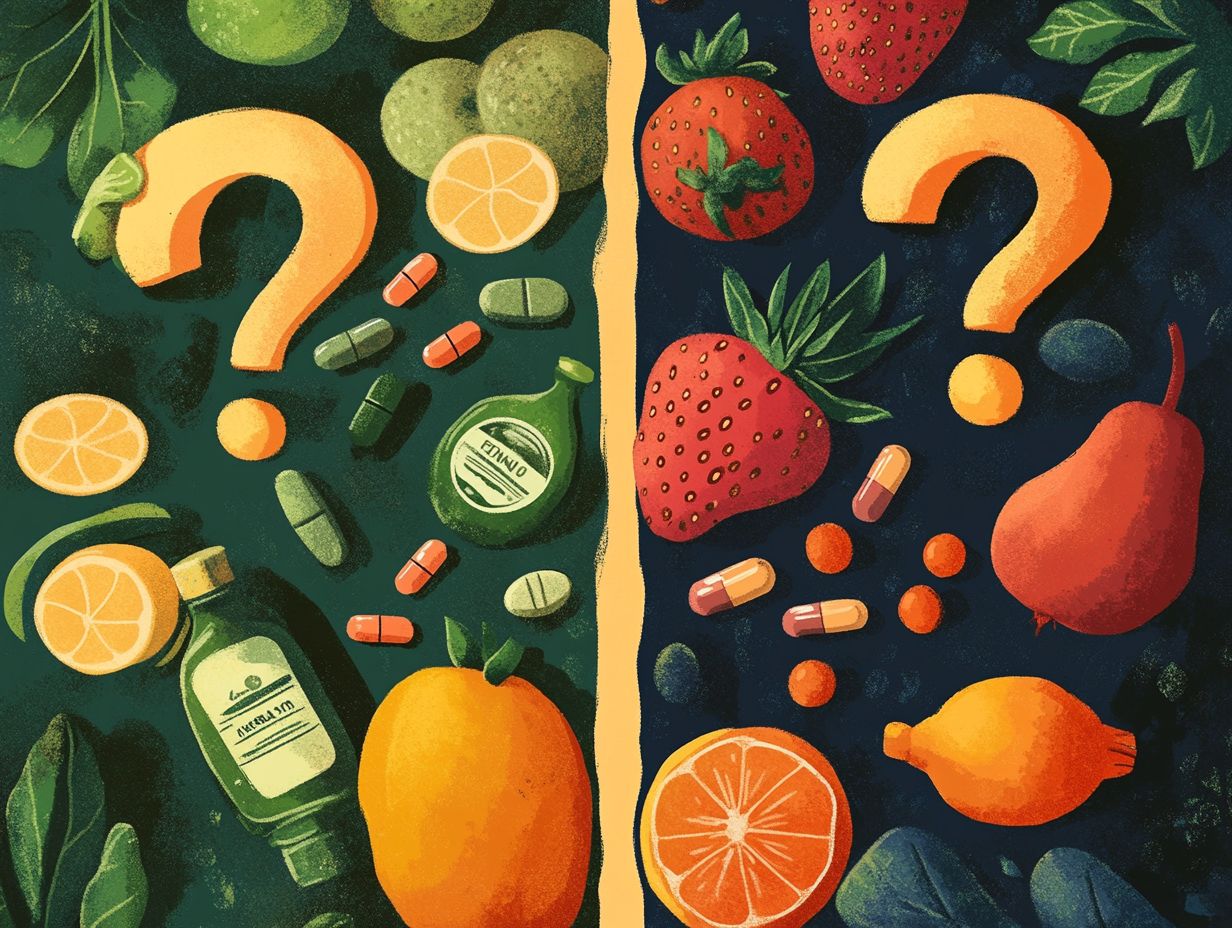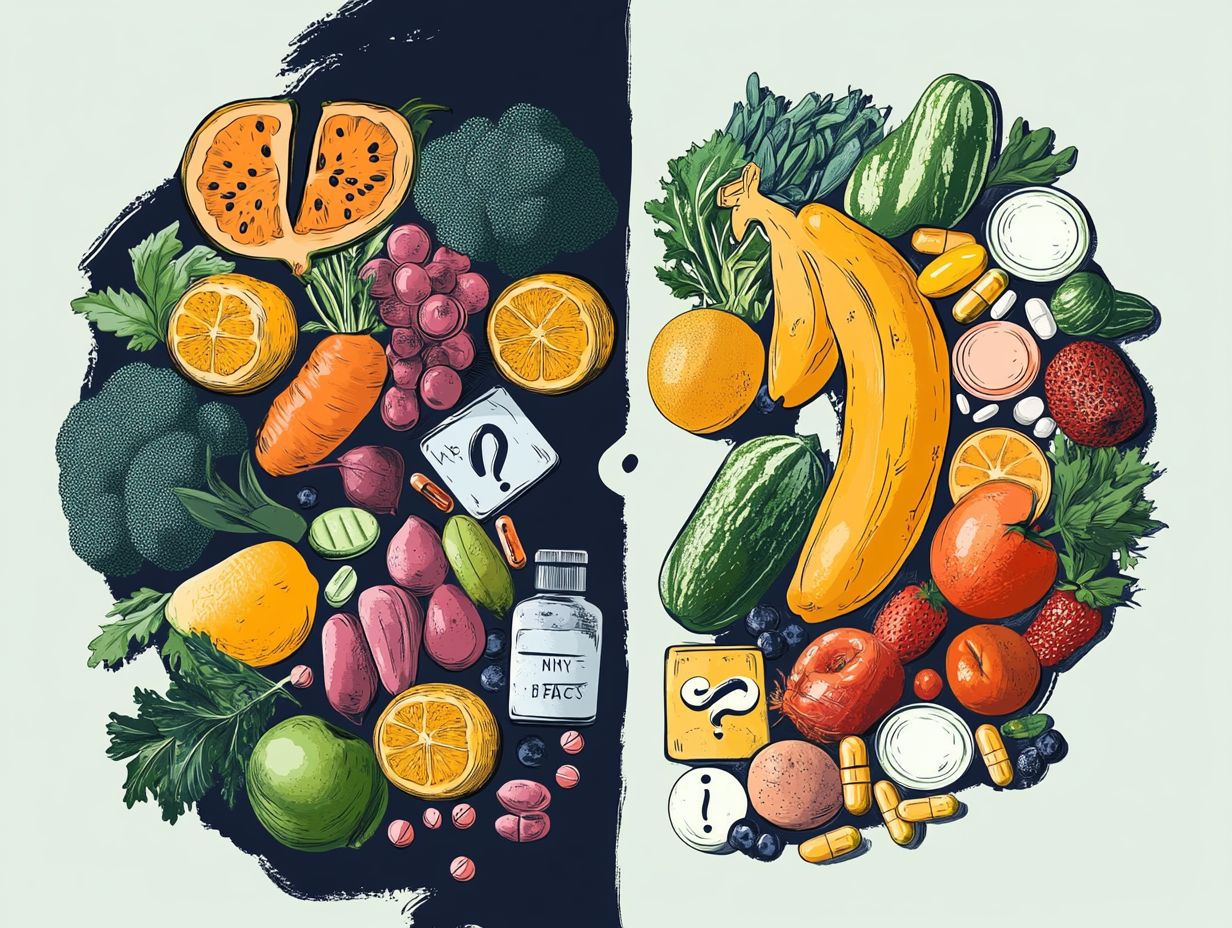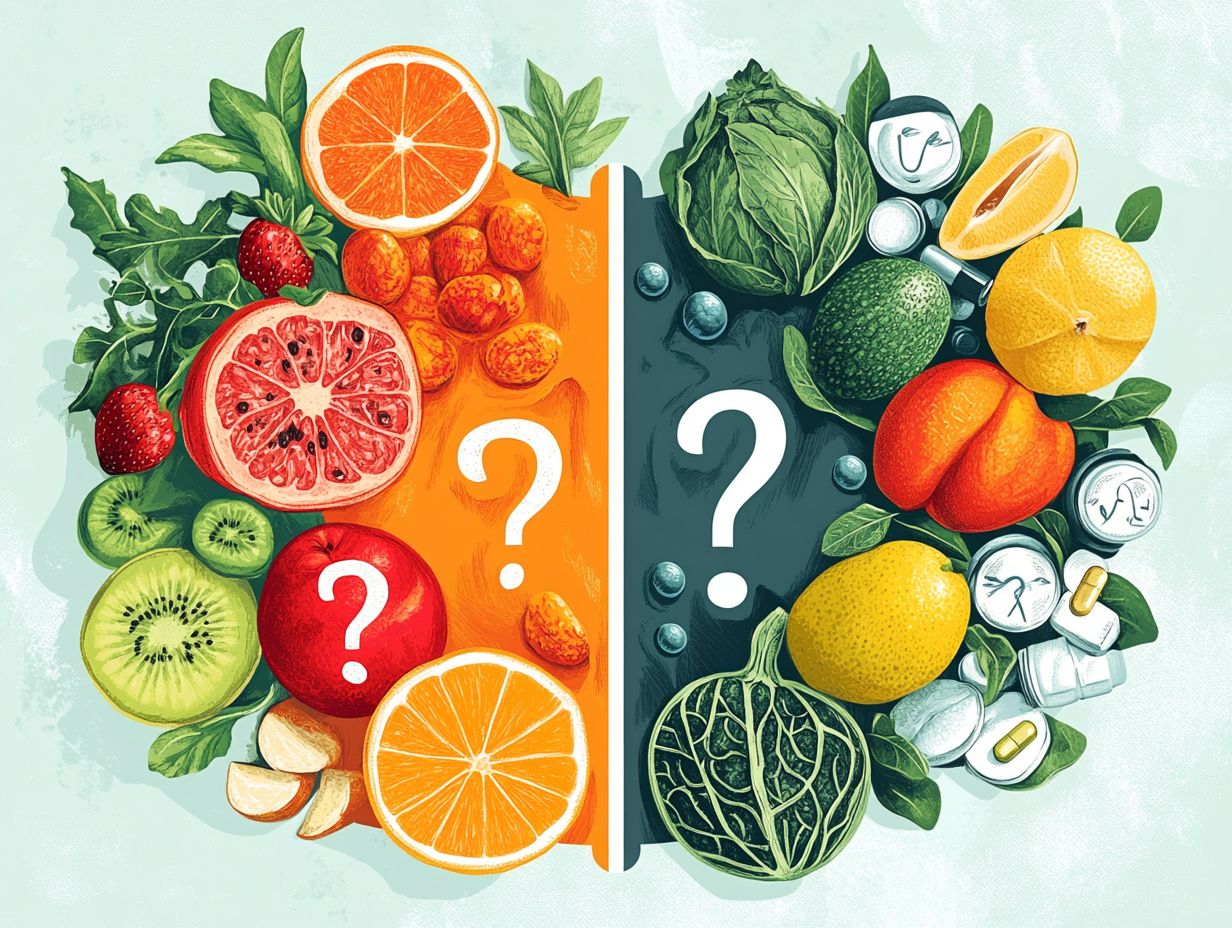Vitamins: Separating Myths from Facts
Vitamins play a crucial role in maintaining your health, yet many individuals find themselves puzzled about their true significance.
This article clarifies what vitamins are and why they matter. You ll explore whether vitamin supplements are necessary, identify the best food sources to ensure you’re getting enough nutrients, and examine the risks associated with overconsumption.
Join us as we separate fact from fiction, empowering you to make informed choices about your vitamin intake.
Contents
Key Takeaways:

Vitamins are essential for maintaining optimal health, but there are many myths surrounding them. Not all vitamins are created equal, and not everyone needs to take vitamin supplements. The best way to get enough vitamins is through a balanced diet that includes a variety of foods from different food groups.
What are Vitamins and Why are They Important?
Vitamins are organic compounds essential for many body functions and your overall health. They work in harmony with minerals to support metabolism, growth, and disease prevention.
These vital nutrients each play their unique roles. Some are key players in energy production, while others enhance immune function or aid in wound healing.
For example, vitamin A helps maintain healthy vision and skin, while the B vitamins are critical for energy metabolism and the proper functioning of your nervous system.
Vitamin C is renowned for its antioxidant properties. It helps with collagen production and boosts your absorption of iron from plant-based sources.
Lacking these vitamins can lead to significant health issues, such as weakened immunity, poor vision, or anemia. A balanced diet with fruits, vegetables, whole grains, and lean proteins is key to staying healthy and avoiding deficiencies.
Common Myths about Vitamins
Despite the abundance of information available, misconceptions about vitamins still linger. These misunderstandings can lead you to make uninformed dietary choices, putting your health at risk by relying solely on supplements instead of whole foods.
Debunking Misconceptions

Many misconceptions about vitamins can mislead you about their sources and functions. For instance, the belief that higher doses of vitamins are always beneficial, or that antioxidants can single-handedly prevent disease, can be particularly misleading.
Such misunderstandings can sidetrack you from a truly balanced approach to your health. Evidence suggests that adequate hydration is vital for optimal bodily functions; even mild dehydration can compromise both physical and mental performance.
Dietary fiber is equally critical for your digestive health, helping to prevent various diseases and maintain a healthy weight. Instead of relying solely on high doses of vitamins or antioxidants, prioritize a well-rounded diet rich in fruits, vegetables, and whole grains.
This approach provides a broader spectrum of nutrients while minimizing health risks. Combating misinformation is essential, as it significantly influences your dietary choices and long-term wellness.
The Truth about Vitamin Supplements
Vitamin supplements can contribute to your health goals, but it’s essential to understand their necessity and any potential health risks.
This knowledge gives you the power to make informed dietary choices, especially when considering that whole foods often offer sufficient nutrition on their own.
Don’t let myths steer you off course let’s uncover the truth about vitamins!
Start your journey to better health today focus on whole foods first!
Do We Really Need Vitamin Supplements?
The need for vitamin supplements often hinges on your individual health goals, dietary choices, and lifestyle factors. This leaves you to ponder whether these additional nutrients are essential for maintaining optimal health.
If you follow a strict vegetarian diet, you might lack vitamin B12, which primarily comes from animal products. Similarly, if you’re in an area with limited sunlight, especially during dreary winter months, you could face vitamin D deficiency.
If you have specific health conditions like osteoporosis or anemia, certain supplements might be particularly beneficial. Always talk to a doctor before starting any new supplements.
Personalized advice, grounded in scientific research and tailored to your health profile, ensures that any supplementation aligns perfectly with your needs without unnecessary excess.
Getting Enough Vitamins through Diet
You can achieve adequate vitamin intake by following a well-planned diet focused on whole foods. Incorporating a variety of fruits, vegetables, and proteins into your meals provides essential vitamins that support overall health.
This approach enhances your well-being and makes the journey toward optimal nutrition enjoyable and sustainable.
Best Food Sources for Different Vitamins

Explore a treasure trove of vitamins within a variety of whole foods. Fruits, vegetables, nuts, and grains are exceptional sources brimming with essential nutrients and antioxidants.
For example, vibrant carrots and sweet potatoes are rich in beta-carotene, a powerful antioxidant essential for eye health. Then there’s spinach and kale, loaded with vitamin K and folate, aiding in blood clotting and bolstering bone strength.
Nuts like almonds and walnuts are great sources of vitamin E, important for protecting your cells from oxidative damage. Don t forget citrus fruits like oranges and grapefruits, packed with vitamin C crucial for a robust immune system.
By incorporating these nutrient-dense options into your daily meals, you can significantly elevate your overall wellness and vitality.
Overconsumption of Vitamins: Risks and Consequences
Vitamins are essential for your health, but overconsumption especially through supplements can pose significant health risks and lead to adverse effects.
This highlights the need for moderation and a well-balanced diet in maintaining optimal wellness.
Can Too Much of a Good Thing Be Bad?
The idea that too much of a good thing can backfire is especially relevant with vitamins. Excessive intake particularly through supplements can lead to serious health complications.
Among vitamins, fat-soluble ones like A, D, E, and K can accumulate in the body, posing risks when consumed in high doses. For instance, overdosing on vitamin A might leave you feeling dizzy, nauseous, or even lead to liver damage.
Excessive vitamin D can raise calcium levels, potentially resulting in kidney stones and compromising cardiovascular health. Understanding the intricacies of supplementation is essential.
It’s wise to pay attention to the recommended daily allowances. Moderation is key to reaping the benefits of vitamins without falling victim to the dangers of overdose. Don t wait! Understanding vitamin intake now can prevent serious health issues later.
Frequently Asked Questions
What are vitamins and why are they important?

Vitamins are essential nutrients that the body needs to function properly. They play a crucial role in maintaining health, growth, and development. Vitamins are involved in various bodily processes, including metabolism, immune system function, and cell growth.
Don’t hesitate to consult your healthcare provider for more personalized advice on incorporating vitamins into your diet!
What are the most commonly known vitamins?
The most commonly known vitamins are A, B (B1, B2, B3, B5, B6, B7, B9, and B12), C, D, E, and K. Each vitamin plays a unique role in keeping your body healthy.
Can you get all the necessary vitamins from your diet?
Yes, a well-balanced and varied diet can provide all necessary vitamins. Factors like age, health conditions, and medications can affect your vitamin absorption, making supplements important in some cases.
Is it safe to take large doses of vitamins?
Taking large doses can be harmful and may cause side effects. Stick to the recommended daily intake and consult a healthcare professional before taking high doses.
Are natural vitamins better than synthetic vitamins?
Natural and synthetic vitamins are chemically the same and work the same in your body. Natural vitamins might come with extra beneficial compounds, while synthetic ones often contain isolated nutrients.
Are there any risks associated with taking vitamin supplements?
Vitamin supplements can help if you have a deficiency, but consider the risks. High doses, medication interactions, and contamination are all possibilities. Always consult a healthcare professional before starting a new supplement and choose reputable brands.






